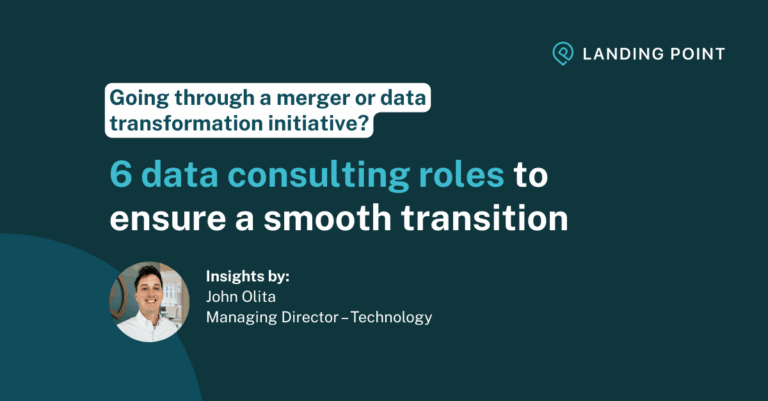By John Olita, Managing Director – Technology, Landing Point Consulting
Mergers and acquisitions (M&A) represent transformative opportunities for growth, innovation, and value creation. Yet, these events are rarely straightforward. The process of integrating companies, systems, and cultures can quickly become a minefield of challenges, particularly when it comes to managing data.
From integrating diverse systems to ensuring compliance across jurisdictions, managing data during M&A requires specialized expertise. For organizations to seize the opportunities while mitigating the risks, having the right partners in place who understand the industry-specific nuances of those systems—the functionality across various division, the compliance associated with the data, and the security needed—is crucial.
These professionals bring clarity, structure, and proven frameworks to what could otherwise be a chaotic and tumultuous process. Below, we explore the most critical data-related consulting roles that can ensure a smoother M&A journey.
Role #1: Data Strategy Development
Evaluating the current state and aligning data strategies with the combined company’s business goals is essential for achieving synergies during an acquisition. Working with the right consulting team and having the right partners from the start can maximize the value of the assets and create a strong foundation for future growth. By ensuring data-driven decisions align with the merged organization’s strategic goals, they help companies make confident, informed decisions during complex transitions.
Role #2: Data Governance and Compliance
M&A activities often involve operating under different regulatory landscapes, requiring a unified approach to data governance. Establishing frameworks and policies to ensure data integrity, security, and compliance across regions is crucial. These measures not only reduce regulatory risks but also foster stakeholder trust by demonstrating accountability.
Role #3: Data Quality and Master Data Management
Inconsistent or inaccurate data is one of the biggest hurdles to successful integration during M&A. Consultants bring expertise in master data management (MDM) and data quality best practices to ensure reliable, accurate, and consistent enterprise data. Clean, harmonized data is crucial for effective decision-making and operational efficiency.
Role #4: Data Analytics and Insights
M&A creates vast amounts of combined data, but its value lies in actionable insights. Data analytics consultants use advanced tools like predictive models and generative AI to unlock synergies, identify growth opportunities, and guide post-merger strategies. Their work ensures the organization leverages its data assets to their fullest potential.
Role #5: Data Integration and Interoperability
Combining data from disparate systems and sources is a key challenge in M&A. Consultants specializing in data integration enable seamless data flows across the organization, driving operational alignment and cross-functional collaboration.
Role #6: Stakeholder Engagement and Communication
Engaging stakeholders is vital to aligning expectations and ensuring buy-in during M&A. Consultants bridge the gap between technical solutions and business objectives, creating alignment across leadership, business units, and functional teams.
Successful M&A initiatives rely on understanding the data needs of all stakeholders. Consultants collaborate with leadership, business units, and functional teams to align expectations and communicate the value of the global data program. This engagement fosters buy-in and ensures the data strategy delivers measurable benefits across the organization.
Mergers and acquisitions are pivotal moments for any organization. By leveraging the expertise of tech consultants specializing in data strategy, quality, and governance, companies can transform uncertainty into opportunity. These experts ensure that the complex process of integration becomes smoother, more efficient, and ultimately, more successful.
With the right team and tools, companies can not only navigate the challenges of M&A but also emerge stronger, more cohesive, and primed for long-term growth.
About John Olita
John Olita is a Managing Director on the Landing Point Consulting team, where he leads technology and contract solutions across the Tri-State area and broader Northeast. With more than a decade of experience supporting financial services and enterprise technology clients, John delivers contract and contract-to-hire solutions for both large-scale transformation projects and one-off needs.
Notable searches include infrastructure, data, and cybersecurity specialists for leading investment banks and enterprise investment managers. His consultative approach balances speed and precision, delivering talent solutions across technology modernization, automation, and cybersecurity.
A graduate of Fordham University, he previously founded a basketball analytics startup used by dozens of colleges and NBA teams. An avid golfer and longtime New York sports fan, he combines a competitive drive with a collaborative approach to business partnerships.

